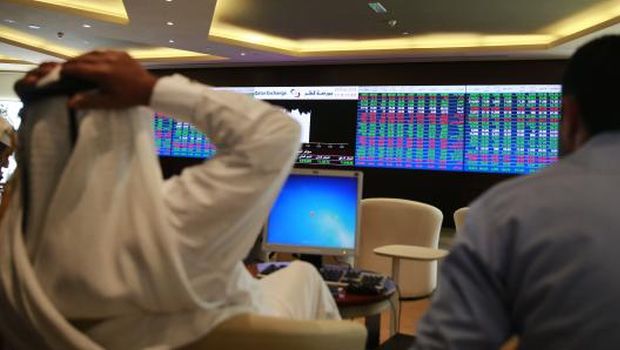
Traders speak with each other as they sit behind their desks in front of the Qatar stock exchange board, in Doha on February 4, 2014. (Reuters/Mohammed Dabbous)
Riyadh, Asharq Al-Awsat—Qatar’s stock market, the Qatar Exchange, saw its sharpest one-day drop in more than six months on Wednesday following a surprise decision by Saudi Arabia, Bahrain and the UAE to simultaneously withdraw their ambassadors from Doha.
The Qatar Exchange’s benchmark QE Index dropped 2 percent, or 241.66 points, on Wednesday, from 11,588.24 to 11,346.58 points, but quickly rallied to 11,571.91 points during Thursday’s trading session, making an almost full recovery.
Speaking to Asharq Al-Awsat, Dr. Mureea Al-Habash, a professor of Accountancy at Saudi Arabia’s King Khalid University, said: “The severe drop [on Wednesday] in the Qatari stock market demonstrates the deep impact this decision will have on the Qatari economy, which will not be able to go it alone without the economies and markets of other countries in the region, particularly Saudi Arabia and the UAE.”
He added that the reaction in Gulf financial markets to the decision was simply an initial response to what are essentially ongoing developments.
Economic and financial expert Fahad Al-Mushari said the losses in the Qatari market were a direct result of the decision by Saudi Arabia, the UAE and Bahrain to pull out their envoys. “Despite the heavy losses in the Qatari stock exchange, the region’s other markets all performed well, which demonstrates that the influence of the Qatari market is extremely limited,” he said.
Saudi Arabia’s benchmark Tadawul All Share Index continued its recent steady ascent rising 12.6 points on Wednesday to 9,161.33 points, its highest level in almost six years.
In Bahrain, the Bahrain Bourse All Share Index dropped slightly by 3 points, or 0.22 percent, on Wednesday, but made a recovery during trading on Thursday, rising 8 points to stand at 1,372.21 at time of writing.
On the Abu Dhabi Securities Exchange (ADX), the main index jumped slightly on Wednesday by 0.36 percent to finish at 4,938.07 points.
The Gulf’s financial markets are some of the region’s most active, and are becoming lucrative destinations for foreign capital amid a positive performance in recent years, despite the geopolitical tensions currently gripping the Middle East.
In a monthly Reuters poll of Middle East-focused fund managers, 53 percent expected to raise their allocations to the region in the next three months, with 60 percent expecting to do so specifically for Saudi Arabia.
“We are optimistic about the Saudi equities story given that there is fresh money coming in from local and institutional players,” John Sfakianakis, chief investment strategist at Saudi investment firm MASIC, told Reuters. “Valuations are on the high side but earnings have done well so far. Expect the market to do well in the first quarter. As markets in other parts of the Gulf do less well given their superb performance last year, expect investor interest in Saudi Arabia.”
